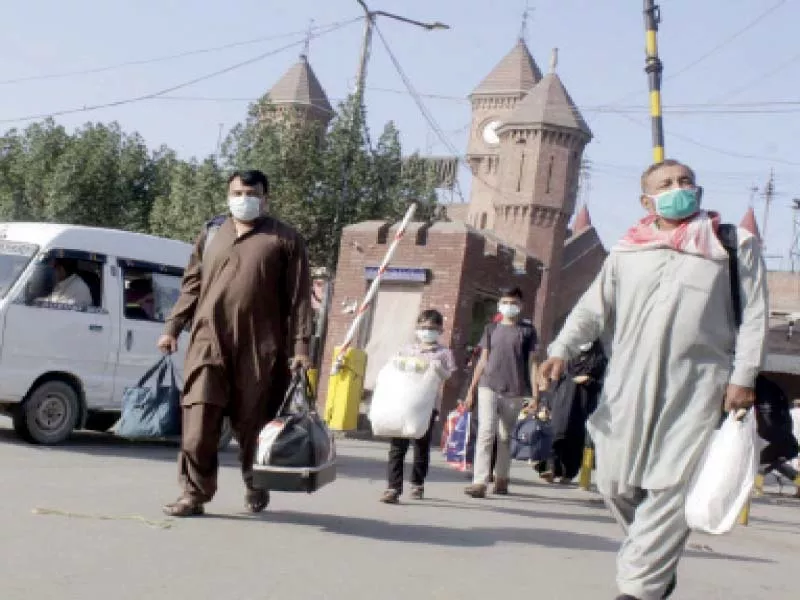Make your choice: stay home or behind bars
Govt decides to impose several restrictions on citizens under the new law
LAHORE: To curb frequent lockdown violations, the government has decided to impose heavy penalties and jail sentences besides empowering the local administration to take strict action against violators under the Punjab Infectious Diseases Prevention and Control Ordinance, 2020.The 13-page ordinance showed that the government has decided to impose several restrictions on citizens under the new law.
It indicates that a person committing an offence or failing without reasonable excuse to comply with any directive, reasonable instruction, duty, requirement or restriction imposed upon him under the ordinance will be punished with imprisonment for a term not exceeding two months and a fine not exceeding Rs50,000 or both on first offence.
A person guilty of repeating offence under this law, shall, on conviction be punished with imprisonment for a term not exceeding six months and fine not exceeding Rs100,000 or both. If the offence is committed by a corporate body, the fine for a first offence shall not be less than Rs50,000 and not exceed Rs200,000, while the fine for a repeat offence shall not be less than Rs100,000 and shall not exceed Rs300,000.
PIA to bring back Pakistanis stranded in UK, Canada
The ordinance empowers the primary and secondary healthcare secretary to impose duties upon all registered medical practitioners and health facilities in the area or, if he considers it appropriate, other parts or whole of Punjab, to record and notify and treat cases of infection or contamination. He can confer functions upon one or more officers and servants or a description of officers and servants of the government, and if so required one or more local governments in Punjab about monitoring and control of public health risk.
The ordinance empowered the secretary to impose a specific or general requirement upon persons who have responsibility for a minor that the minor shall be kept away from school; and to impose a specific or general restriction or requirement relating to the handling, transport, burial or cremation of dead bodies or the handling, transport or disposal of human remains.
It also empowered the deputy commissioners to take such steps or pass such orders as he considers necessary to an officer subordinate to him or a police officer. For enforcement of an order, direction, restriction or requirement issued by the deputy commissioner, an officer subordinate to him, a police officer or any other person referred in the law to enter any premises; detain persons for a maximum period of 24 hours; and if necessary, use reasonable force.
The secretary may issue directions prohibiting, or imposing one or more requirements or restrictions on the holding of an event or gathering for a specified period.
A direction may, amongst other related issues, impose requirements for the purpose of closing or sealing the premises; restricting entry into the premises; and securing restrictions in relation to the location of persons.
The ordinance has provision of removal and retention of potentially infectious persons to a place suitable for screening and assessment.
A notified medical officer may require a potentially infectious person to remain at a place suitable for screening and assessment for a period which shall not ordinarily exceed 48 hours unless — on the opinion of the notified medical officer, the person shall be retained for a longer duration for valid satisfactory screening.
The provisions of law shall also apply mutatis mutandis to a person who reports to a place specified for screening and assessment at his own accord.
After each subsequent interval of 24 hours during which a person is retained at a place specified for screening and assessment, the notified medical officer shall review the need for continuing his retention.
Where a person is required to remain at a place, the notified medical officer may direct a police officer to enforce such a requirement. After each subsequent interval of 48 hours during which a person is subjected to a restriction or is retained under this section, the notified medical officer shall review the need for continuing the restriction or retention.
After making a review, the notified medical officer may withdraw a requirement or restriction if he considers that the person subjected to a restriction or retention under this section is no longer potentially infectious or contaminated; substitute a different requirement or restriction; or extend the period of a requirement or restriction if he considers that the person will be potentially infectious or contaminated at the end of that period.
No coronavirus case was imported from China: PM Imran
The ordinance states that a person who has responsibility for a minor or a ward shall, so far as reasonably practicable, secure that the minor or, as the case may be, the ward complies with any direction, instruction, requirement or restriction imposed upon him under this ordinance.
In the like manner, a person who has responsibility for a minor or a ward shall provide to the person exercising a power under this ordinance such information and assistance in relation to the minor or, as the case may be, the ward as is reasonably necessary and practicable.
The ordinance impose duty on every person, including head of a family; a health care provider, including every physician who believes that a person under his care, supervision or control is suffering from an infectious disease or is contaminated, to report such case to a notified medical officer immediately.
Published in The Express Tribune, March 26th, 2020.


COMMENTS
Comments are moderated and generally will be posted if they are on-topic and not abusive.
For more information, please see our Comments FAQ